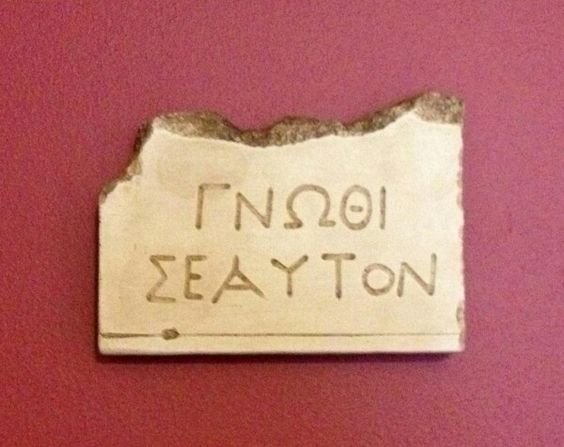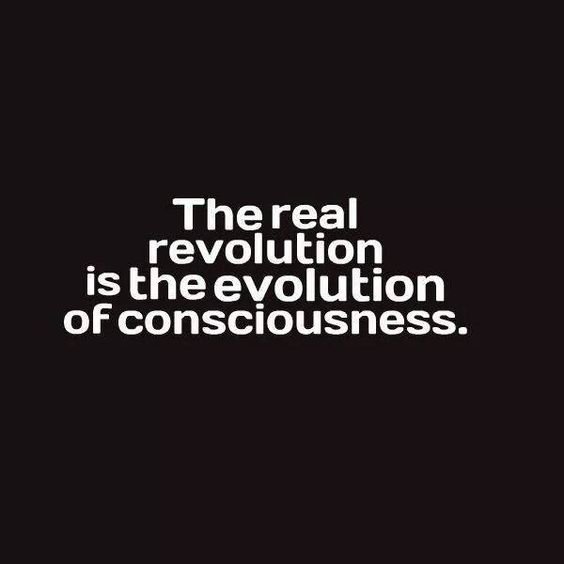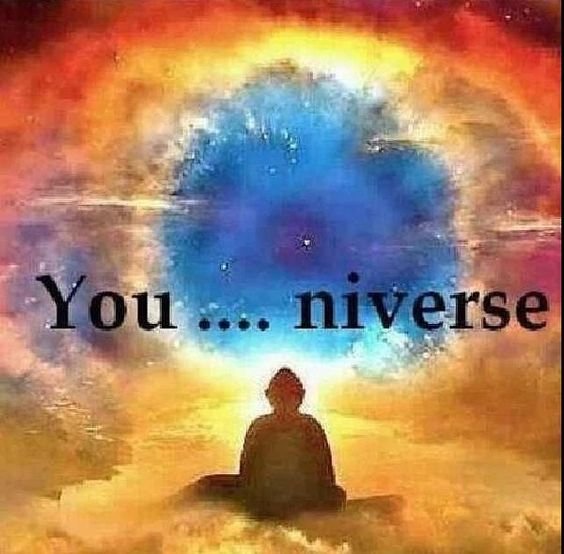For thousands of years people have searched for the answer to this question. It kept the minds of many great thinkers occupied and each of them came to conclusions that are still valuable today. Based on that knowledge I will take it one step further, trying to answer the biggest question of all times with a 21th-century perspective: Who or what are we?
The ‘oldtimers’
Asking this question to ourselves it is unavoidable to return to earlier days. From the moment our brain permitted us to think people have wrestled with this question. It was in ancient times that self-knowledge was seen as the highest wisdom there was. The Greek thinker Socrates said once that it was ridiculous when people were trying to answer complicated questions without knowing themselves. Plato went even further; according to him, self-knowledge would lead to a better understanding of others. Their conceptions were not based on their own convictions but found their origin even further back in time, all the way back to Egypt. When old hieroglyphs were transcribed they taught us ancient lessons like: ‘The body is the temple of the god within you, therefor it is said Know Yourself’. Another Egyptian saying stated that when somebody knows himself, that person will know the gods. Where and when these sayings found their origin is hard to say but what it clearly shows is that self-knowledge was very important in ancient times. It was so valuable that it was inscribed in the temple of Apollo in Delphi as γνῶθι σεαυτόν, translated to Know Thyself. According to the Greek philosopher Thales of Miletus this path to self-knowledge was not an easy one, in fact, it was the most difficult task in life. In modern times this conviction was kept alive by many people.
''Without self-knowledge, without understanding the working and functions of his machine, man cannot be free, he cannot govern himself and he will always remain a slave’’ – George Gurdjieff

Who am I?
If self-knowledge is the most important thing according to many great thinkers, what does it teach us? With this question in mind, I picked up an interesting conversation between two men while I was sitting next to them on a terrace. I did not know them but I could tell that they too, or at least one of them, were interested in the most important thing in life as proclaimed by some great minds. The conversation went on like this:
Who are you?
I am John
No, I don’t ask you what your name is, I ask you who you are
I am a businessman
No, I don’t ask you what you are doing, I ask you who you are
I am the owner of a big house with a very big garden
No, once again, I did not ask you what you have but who you are
I am a man?
No, I didn’t ask you for your sex but who you are
I am successful and rich!
That is what you have, not who you are
Alright, so I am human
Oh, which part of the human then?
Well, this is my body!
Okey, but you say: this is my body, so who are you?You don’t say: I am this body. Where are you hidden in that body?
Pffff… I don’t know
Would you be John without arms and legs?
Yes
And if we replace your organs for donor organs or artificial ones? Would you be still John?
Yes
And if your senses would stop functioning, are you still John?
Yes, I think that I am my thoughts!
Alright, so if you think that you are a serial killer, would you be one?
No
So, who are you?
Well, I think so I am, like Descartes said. I am my thinking power!
Okey, so imagine this, if you were born and everybody on earth would disappear, you grew up alone without seeing another human. Would you still be John because you have thinking power?
That is an interesting one…. I don’t think so. I would never know what a human is or who I would be without others
And now you say: I would not know who I would be. So who is it?
That must be a thought then
Indeed! The I-thought only exists in your head! It evolves from your ego, which every person has. We are nothing more than just a thought, isn’t that interesting??
And even though eavesdropping is not very polite to do, it was very interesting to follow this conversation. It made me think. If the I in which I identify myself is just a thought from your ego, it doesn’t mean that you become what your ego tells you because that is also just a thought. There must be something higher that stands above your ego and your thoughts. Albert Einstein, one of the greatest minds of the twentieth century answered this question by stating that:
‘’A human being … experiences himself, his thoughts and feelings as something separated from the rest, a kind of optical delusion of his consciousness.’’
If we are descending to the deepest essence of a human being, all that there is to it is what Einstein calls consciousness. This is the observer that stands above our thoughts. Real self-knowledge is being conscious of your thoughts, feelings, and actions. You are consciousness!

So what now?
Now you know that you are not a thought but consciousness, you can continue in close contact with your true essence. Live conscious because the more you follow routine and the less you think, the further away you get from who you really are. No human exist to be a machine that does whatever others want him to do. We need to ask ourselves questions all the time. Only dead fish go with the flow. In ancient times they saw the body as the temple of the inner god and they taught man that they could get to know the gods by knowing themselves. By accepting that we are consciousness and nothing more, we meet this inner god. Would god be the right description? I think so. If you are conscious of your emotions you will know that you are not, for example, angry, but you choose to feel angry. You don’t become your emotion but you are creating a temporal situation in which you experience this emotion. And because the word god in our vocabulary stands for an energy that creates and controls we can call our consciousness god. You create in this example your anger and you allow it to exist as long as you want. And only when you undertake action this anger will resolve.
If you take this knowledge to a next level you will see that consciousness controls all life forms. A cow eats because she is aware of hunger and a plant is growing towards the sun because it is somehow aware of it. However, the human is a special case. Because of our I-thought we put ourselves above everything and we think that we control ourselves, but humans too are part of this universal energy called consciousness. It goes even further because even particles are conscious. Quantum physics showed that particles within an atom are changing shape the moment they are ‘aware’ of a spectator. This made Einstein wonder: ‘’Does the moon exists when nobody is looking?’’
Descartes expressed the takeover of the ego over consciousness by stating that thinking was the essence of being. It was this thought that gave way to the feeling that we are separated from anything else, what thus an optical illusion was of our consciousness. This illusion started to live an own life and took over great parts of the world. The I-thought versus the rest of the world have profoundly changed our society, but not everywhere. There, where the Homo Sapiens first emerged, exists still the ancient knowledge of universal connection. Would it be a coincidence that this knowledge is gaining popularity today? I don’t think so. Human constantly searches for new feelings of happiness when the old doesn’t satisfy anymore. The further away we get from our true essence, the emptier life seems.

So, if everything is connected by the same energy and if we don’t know who we are if there wouldn’t be other persons around us like John said, then the old African words Umuntu Ngumntu Ngbantu do not sound that alien. A human is a human because there are others. I am because you are. Plato was right when he stated that self-knowledge will lead to a better understanding of the other. When you are conscious of who you are, you will realize that we are all the same. Be aware of everything around you because that is what makes you as a person. To be true to ourselves we need to be conscious of our thoughts and actions. Why do you think what you are thinking, why do you feel what you are feeling, why are you doing what you are doing and how does it contributes to the bigger picture? To answer these questions you will need to engage on the road to self-knowledge, it requires self-observation to become aware of everything that is unconscious in you. The less unconsciousness there is, the more we become ourselves!
‘’To know oneself is a long process. First, we must study’’ – Pjotr Demjanovitsj Ouspensky
Great article :) Makes me really think of who I really am. Thanks for sharing!
It took me a while to press the POST button but I am glad I did and you enjoyed reading my article! Thanks!
Yes loved it...great knowledge you have there! So spread the world :)
I will, got a lot more to write about :) Stay tuned!
awesome article I enjoyed reading thank you.
Thank you!